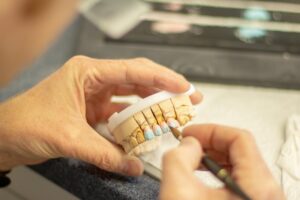Being a dentist is often portrayed as a glamorous and lucrative profession, but the reality is far more nuanced. While dentistry offers many rewards, it also comes with its own set of challenges and misconceptions. In this article, we’ll explore the truth about being a dentist, debunking common myths and shedding light on the realities of the profession.
Myth: Dentists only deal with teeth.
Reality: While dentists primarily focus on oral health and dental treatments, their scope of practice extends beyond just teeth. Dentists are trained to diagnose and treat a wide range of oral conditions, including gum disease, oral infections, oral cancer, and temporomandibular joint (TMJ) disorders. They also play a role in promoting overall health by identifying systemic conditions with oral manifestations, such as diabetes and cardiovascular disease.
Myth: Dentistry is a low-stress profession.
Reality: While dentistry can be rewarding, it is not without its stressors. Dentists must juggle clinical responsibilities, patient care, administrative tasks, and the demands of running a practice. Dealing with difficult patients, managing emergencies, and navigating complex treatment plans can contribute to stress and burnout. Additionally, dentists face the pressure of staying abreast of advancements in technology and techniques while balancing work-life integration.
Myth: Dentists make a lot of money.
Reality: While some dentists may earn high incomes, especially those in specialized fields or private practice, income can vary significantly depending on factors such as location, experience, practice type, and patient demographics. New graduates often face student loan debt and overhead costs associated with starting or purchasing a practice. Additionally, declining insurance reimbursements and changes in healthcare economics can impact dentists’ earning potential.
Myth: Dentistry is a solitary profession.
Reality: Dentistry is inherently collaborative, requiring dentists to work closely with dental hygienists, dental assistants, specialists, and other healthcare professionals to deliver comprehensive patient care. Collaboration fosters teamwork, improves treatment outcomes, and enhances the patient experience. Dentists also engage with interdisciplinary teams, referring patients to specialists as needed and collaborating with physicians and other healthcare providers to address systemic health issues.
Myth: Dentistry is not emotionally taxing.
Reality: Dentists often develop close relationships with their patients, providing emotional support and counseling in addition to clinical care. They may encounter patients with dental anxiety, fear of procedures, or past traumatic experiences, requiring empathy, patience, and effective communication skills. Dealing with patient pain, dissatisfaction, or unexpected outcomes can also take an emotional toll on dentists, highlighting the importance of self-care and emotional resilience.
Myth: Dentistry is a stagnant profession.
Reality: Dentistry is a dynamic and evolving field, with continuous advancements in technology, materials, and treatment modalities. Dentists must stay current with evidence-based practices, attend continuing education courses, and adapt to changes in regulations and standards of care. Innovation in digital dentistry, laser technology, implantology, and cosmetic dentistry is transforming the way dentists diagnose, plan, and deliver treatments, enhancing patient outcomes and satisfaction.
There are also other things to consider such as:
Work-Life Balance
While dentistry can offer flexibility in scheduling, especially in private practice settings, achieving a healthy work-life balance can be challenging. Dentists may work long hours, including evenings and weekends, to accommodate patient needs and manage practice operations. Finding a balance between professional responsibilities and personal life is essential for overall well-being and career satisfaction.
Physical Demands
Dentistry can be physically demanding, requiring prolonged periods of standing, precise hand-eye coordination, and fine motor skills. Performing repetitive tasks, such as dental procedures and instrument manipulation, can lead to ergonomic strain and musculoskeletal issues if proper techniques and ergonomic practices are not followed. Dentists must prioritize self-care, ergonomics, and regular exercise to prevent occupational injuries and promote longevity in their careers.
Emphasis on Prevention
Dentistry has shifted towards a preventive care model, focusing on educating patients about oral hygiene, nutrition, and lifestyle habits to prevent dental problems before they arise. Dentists play a vital role in promoting oral health education, disease prevention, and early intervention to reduce the incidence of dental decay, periodontal disease, and other oral conditions. By empowering patients to take control of their oral health, dentists can improve overall health outcomes and reduce the need for extensive dental treatments.
Patient Diversity and Cultural Competence
Dentists serve a diverse patient population with varying cultural backgrounds, languages, and socioeconomic statuses. Effective communication, cultural sensitivity, and empathy are essential for building trust and rapport with patients from diverse backgrounds. Dentists must adapt their communication style, treatment approach, and care delivery to meet the unique needs and preferences of each patient, fostering inclusivity and equitable access to dental care.
By considering these additional aspects of being a dentist, individuals can gain a more comprehensive understanding of the profession and its impact on patients, communities, and society as a whole.
In conclusion, being a dentist is a multifaceted profession that offers both rewards and challenges. While dentistry provides opportunities for meaningful patient interactions, clinical expertise, and professional growth, it also requires dedication, resilience, and a commitment to lifelong learning. By debunking common myths and embracing the realities of the profession, dentists can navigate their careers with clarity, purpose, and fulfillment.





